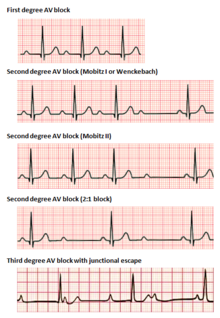| Atrioventricular block | |
|---|---|
 | |
| Representative electrocardiogram recordings of the different degrees of heart block | |
| Specialty | Cardiology |
Atrioventricular block (AV block) is a type of heart block that occurs when the electrical signal traveling from the atria, or the upper chambers of the heart, to ventricles, or the lower chambers of the heart, is impaired. Normally, the sinoatrial node (SA node) produces an electrical signal to control the heart rate. The signal travels from the SA node to the ventricles through the atrioventricular node (AV node). In an AV block, this electrical signal is either delayed or completely blocked. When the signal is completely blocked, the ventricles produce their own electrical signal to control the heart rate. The heart rate produced by the ventricles is much slower than that produced by the SA node.[1]
Some AV blocks are benign, or normal, in certain people, such as in athletes or children. Other blocks are pathologic, or abnormal, and have several causes, including ischemia, infarction, fibrosis, and drugs.
- ^ Kashou, Anthony H.; Goyal, Amandeep; Nguyen, Tran; Chhabra, Lovely (2019), "Atrioventricular Block", StatPearls, StatPearls Publishing, PMID 29083636, retrieved 2019-11-12